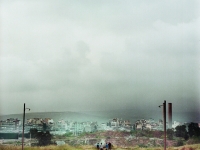Arts
Yannis Karpouzis, winner of Descubrimientos PHE15 Award
For the series The Parallel Crisis
A work in progress that explores photography and the crisis in Greece, his native country, as factors that stop time. The series shows portraits contextualized in the landscape that reveal strength and contrasts. Characters and locations to which convey a sense of unease. The award will allow Karpouzis to take part in PHotoEspaña 2016 with a solo exhibition.
The photographer explains that “a crisis is any event that is, or is expected to lead to, an unstable and dangerous situation affecting an individual, group, community, or whole society. Crises are deemed to be negative changes in the security, economic, political, societal, or environmental affairs, as they occur abruptly, with little or no warning. More loosely, it is a term meaning 'a testing time' for an emergency event".
“It is said that photography happens to be the most naïve of all media because of its intention, its ability to immobilize time. That is why photographs are usually beautiful but sad. The only time that the camera can reproduce is dead time, time already spent. In the last five years, Athens has dramatically changed; the whole city is transformed into a negative plateau, immobilized in time. The flow of life has changed for its citizens. Their time is not their own, it is a stolen and already used time, reminiscent of the already spent time of photography,“ Karpouzis says.
He added: “Photography was invented in the 20th century to depict the huge flow of information that started to define metropolitan modern life. Today the media are much more detailed and complex in depiction of the topography of life. Nevertheless, photography retains as privilege its biggest disadvantage: Immobilized and spent photographic time is the most suitable canvas to upload our frozen moments, the no-way transits, the junkyards behind our houses, all the people waiting silently to sell their replacements. Photography reaches its poetic destination when it narrates the tale of the imprisoned, of those men whose time was spent the immobilized men."
Yannis Karpouzis was born in Athens on the 6th of June, 1984. He obtained his Civil Engineering Diploma from National Technical University of Athens (2009). In 2006, he moved for six months in Copenhagen (Erasmus program) where he got involved with creative photography. Yannis elaborated his master thesis investigating the role of modern photography and cinema in the history of art. He has traveled to a lot of northern countries with main purpose to get occupied with video and photography (Norway, Sweden, Finland, Germany, Netherlands, Austria). In 2009, he was selected to participate in the Postgraduate Program 'New Media - Digital Arts' of the Athens School of Fine Arts which finished with an excellent mark (8,43/10).
He studied photography for four years next to the photographers Nicos Dimolitsas (Greek Opera House) and Manolis Babousis (Athens School of Fine Arts). In 2012 he attended with the first scholarship the 'New School of Athens' film workshop, organized by the, awarded, film maker Athena Tsangari. He gives lectures on the aspects of modern and contemporary photography in the cultural union “Aneresis“. His work has been presented in Magnum professional workshop London 2015, Noorderlicht Photo Festival, The Contemporary Museum of Thessaloniki, Benaki Museum ““ Athens Modern Art Museum, Athens Photo Festival 2011, Energy Athens (European Center of Architecture) and Michael Cacoyannis Foundation.
This portfolio was presented at the portfolio review framed within Descubrimientos PHE Week held in PIC.A. PHotoEspaña International Centre Alcobendas from 1 to 6 June 2015. The jury formed by Bravetta Lorenza , founder of Centro Italiano per la Camera Photography Turin (Italy); Gilles Favier, of ImageSingulières from Sète (France); and Markus Hartmann, Hartmann editor and curator of Special Projects from Stuttgart (Germany) have chosen the winner from among all those participants in the portfolios reviews in Rosario, Tegucigalpa and Madrid.
Liability for this article lies with the author, who also holds the copyright. Editorial content from USPA may be quoted on other websites as long as the quote comprises no more than 5% of the entire text, is marked as such and the source is named (via hyperlink).






